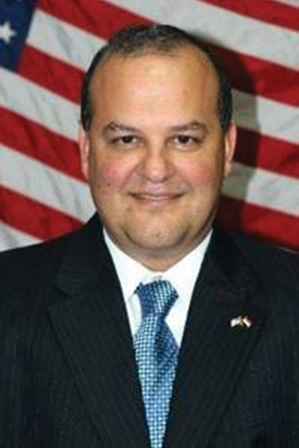2020: How Are We Doing?
State VP Voice
BY TOM YAZDGERDI

2020 has been a tough and unusual year for us all. In this time of a continuing pandemic and a hyperpartisan political landscape, I want to update you on AFSA’s response to key issues that affect the well-being of our members.
End of Global Authorized Departure. By the time this issue goes to print, we will be days away from the Dec. 9 deadline for those on GAD to either return to post or take a no-fault curtailment. We know that our members have faced a difficult decision, especially as the COVID-19 situation abroad (and at home) has worsened in recent weeks.
For that reason, AFSA President Eric Rubin wrote to Under Secretary of Management Brian Bulatao on Oct. 6, asking that the sliding scale on lodging and per diem be removed and that posts not be treated with a one-size-fits-all policy.
While the sliding scale is unfortunately still in place, AFSA nonetheless got a win—the department will pay for any costs of breaking a lease.
We continue to worry that as the pandemic worsens overseas, employees might have to return to an unsafe situation, or that post leadership might feel pressured not to seek authorized or ordered departure, even if the situation warrants.
Indeed, as of this writing, AFSA does not know of a single post that has formally reversed course and returned to an earlier phase under the Diplomacy Strong initiative. If you think this is happening in your case, please let us know, and we will follow up.
New COLA Methodology. As you know, the department has instituted a new methodology for calculating the cost of living allowance (COLA) for overseas posts (see 20 STATE 378 and 20 STATE 100230).
In Fiscal Year 2020, the department hired an independent contractor to determine the COLA based on three commercial surveys, rather than having posts do it themselves. The three survey companies are widely recognized, reputable sources of COLA rates used by multinational corporations.
While AFSA generally supports rationalizing this process and taking the burden off posts and bureaus to conduct the yearly “basket of goods” survey, we have expressed concern to the Bureau of Global Talent Management that the methodology may not account for some unusual circumstances—for example, the economies of some small island nations that import many of the goods available.
AFSA also noticed that COLAs were reduced in a majority of posts, and that the department felt compelled to cap this loss at 20 percent. We will continue to engage with GTM and the Bureau of Administration to ensure our members get answers on how a particular COLA was calculated. Please let us know if you have any comments or concerns.
The Annuity Exception. The annuity exception allows members of the Foreign Service at the FS-2 level or below who are TIC-ed out but have yet to reach age 50 to remain in the Service, without further promotion, until reaching that required milestone, at which point they retire with their pension and health insurance.
This provision came about as a result of the tragic suicide of one of our members in 1971 before he reached the age of 50 and 20 years of service.
In recent years, the department has looked into eliminating the annuity exception—which could hurt members who may TIC out at the FS-2 level because of limited promotion opportunities. (For a fuller discussion, see the June 2019 State VP column: afsa.org/terrible-twos.)
The department first told us that the annuity exception was contrary to the spirit of the up-or-out system and later told us that the Office of the Legal Adviser maintained it was at odds with the Anti-Deficiency Act.
On Oct. 1 AFSA President Rubin wrote to the Director General underscoring in the strongest possible terms our opposition to eliminating the annuity exception.
The DG responded on Oct. 7, noting that while there are no current plans to change policy, this provision would continue to be examined in the context of the Foreign Service Act. We will remain vigilant.
Worldwide Availability on Entry. AFSA continues to be interested in a class-action suit pending before the Equal Employment Opportunity Commission involving 250 applicants with disabilities who were denied entry to the Foreign Service because they were not 100 percent “worldwide available.”
We understand that this issue remains in litigation, and there are reports that the parties may engage in settlement discussions.
As we weigh whether to support the continuation of the policy of 100 percent worldwide availability on entry, we want to consider the merits of the class-action suit and any potential settlement proposals. We will keep you informed as the process goes ahead.

